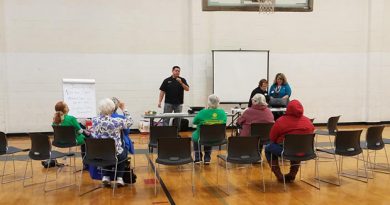Connecting With Mental Health: Online Resources
Trying to find useful online resources for your mental health needs can be overwhelming and confusing. With so much information to sort through, it can seem like one more stressful thing to add on. That can be especially true today, during this time of COVID-19, when we are all challenged to find new ways to learn, stay healthy, and connect. This article identifies easy strategies for finding mental health resources, including tips on some options that consumers and staff here at Valeo BHC have particularly liked.
Online resources for mental health can take the form of apps, websites, podcasts, videos, social media, as well as remote meetings. All can be helpful, so you may want to test some of these out to find the ones that work best for you.
Many like using an online app to help manage symptoms or particular problems. To get started, you can do an app store search on your phone or internet device. Enter a specific topic in the “search” field, such as mindfulness or anxiety. Once some options come up, look for apps that have reviews with high ratings, along with noting how many reviews the app has had. You might also want to check for up-front, subscription, or other add-on costs that might affect your choice.
Another easy start is to do a google search titled “list of mental health apps.” The caution here is to be aware that sometimes these lists are actually paid advertisements for a specific product. You will know if the list is a product promotion if you will find the words “Advertisement” or “Sponsored” noted (often in small print) somewhere on the page. Free apps that have received good reviews from people we have worked with include MoodTools (which has different versions for anxiety and depression), WoeBot, Vent and Virtual Hope Box.
READ: Four Resolutions That Will Benefit Your Mental Health
There are also many good mindfulness and meditation apps available, such as Insight Timer and Smiling Mind. Mindfulness is a great addition to self-care and can be helpful in improving sleep, managing worry, and reducing tension and pain. When looking for a mindfulness app, be aware that many have limited free content or a limited number of days for free content. Then you need to subscribe to keep the content available. Some workplaces offer free subscriptions to these apps via their employee wellness programs, so that is something worth checking out.
Podcasts are another popular option for mental health information and coping skills. Some highly rated ones on the ITunes store are Mental Illness Happy Hour; Therapy for Black Girls; The Hilarious World of Depression; The Happiness Lab; and Nothing Much Happens (which is a bedtime story podcast). As an example, The Mental Illness Happy Hour podcast has over 5,000 ratings with an average score of 5 out of 5 stars. It includes interviews with mental health specialists, as well as people in recovery, and covers special topics like Coping in a Pandemic. Given the range of topics, odds are you will find a mental health podcast that appeals to you.
YouTube and Ted Talks are also a wonderful resource. Authors, researchers, therapists and many others offer mental health inspiration, and these are usually brief, lasting from 5-20 minutes, so they are easy on your schedule. Again, just look for the ones that have many positive reviews and check one out. Therapy in a Nutshell (YouTube) and anything by Brene Brown (Ted Talks) are excellent. Priya Parker; Guy Winch; and Sangu Delle are also notable presenters.
Video conferencing apps are also widely available and used. Now, with COVID-19 precautions in place, many organizations are using video conferencing apps to connect on a wide variety of topics. Organizations like AA.org, NA.org and NAMI.org all have lists of virtual support groups on their website, noting times and directions on how to connect. These are safe ways to access the same kind of critical support that live meetings have offered. Churches, book clubs, fitness instructors and families separated by social distancing and quarantines are also turning to online and video conferencing resources for social and supportive interactions. We are all finding creative ways to stay connected.
If you would like to reach out to a mental health professional, Valeo BHC is still available to help by contacting 234-3300 for service information or crisis service. You may also want to check on your personal health insurance company website or contact your employer’s Employee Assistance Program. At this time, there are many options for Telemedicine in all health professions, and for those struggling with suicidal feelings, 1-800-273- TALK (8255) is a ready resource.
These are all great resources for a wide variety of behavioral health concerns and it is our hope you will find something from the suggestions noted that speaks to you and helps you grow. In this time of social change and stress, connecting and keeping our minds alive will help us all get through.
–By Theryn Spomer, LMSW
Valeo Behavioral Health Care
785-233-1730
Crisis Services
400 SW Oakley
Topeka, KS 66606
24 Hour Crisis Line
785-234-3300
National Suicide Prevention Life Line
1-800-273-8255
Shawnee County Suicide Prevention Coalition
SCSPC.org
Family Service and Guidance Center (18 and under)
325 SW Frazier
Topeka, KS 66606
24 Hour Crisis Number
785-232-5005
Healing after Loss to Suicide Group (HeALS)
Sandy Reams – Group Facilitator
Topeka.Heals@gmail.com
785-249-3792
Go here to visit the Topeka Health and Wellness Facebook page for local event notices, news and local announcements. To help us spread the word, and to continue seeing our posts on your Facebook feed, “Like” the page and then like or share a story now and then, so that they will keep showing up in your feed.






Pingback: 5 Ways to Care for Your Mental Health During Coronavirus - Topeka Health and Wellness